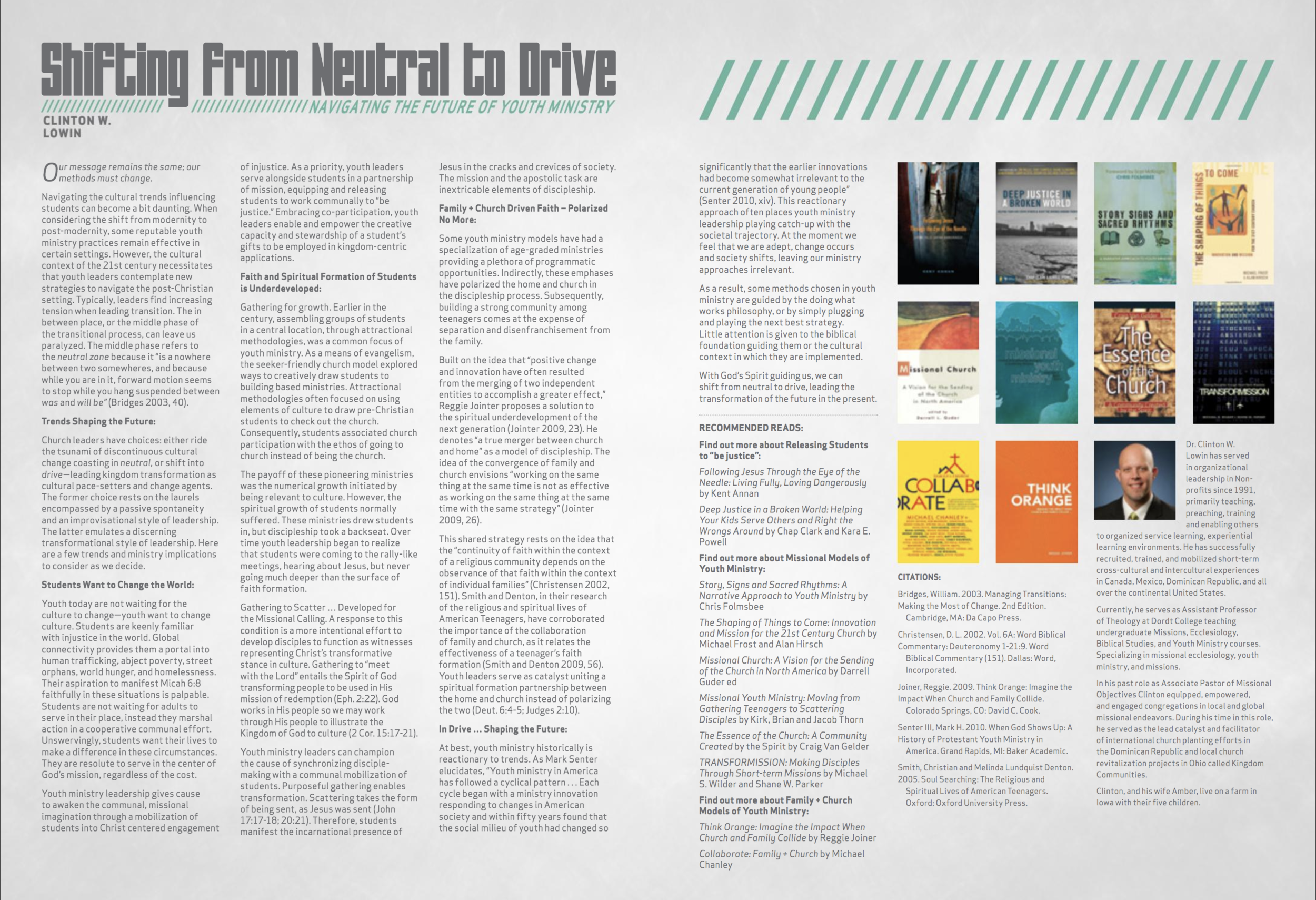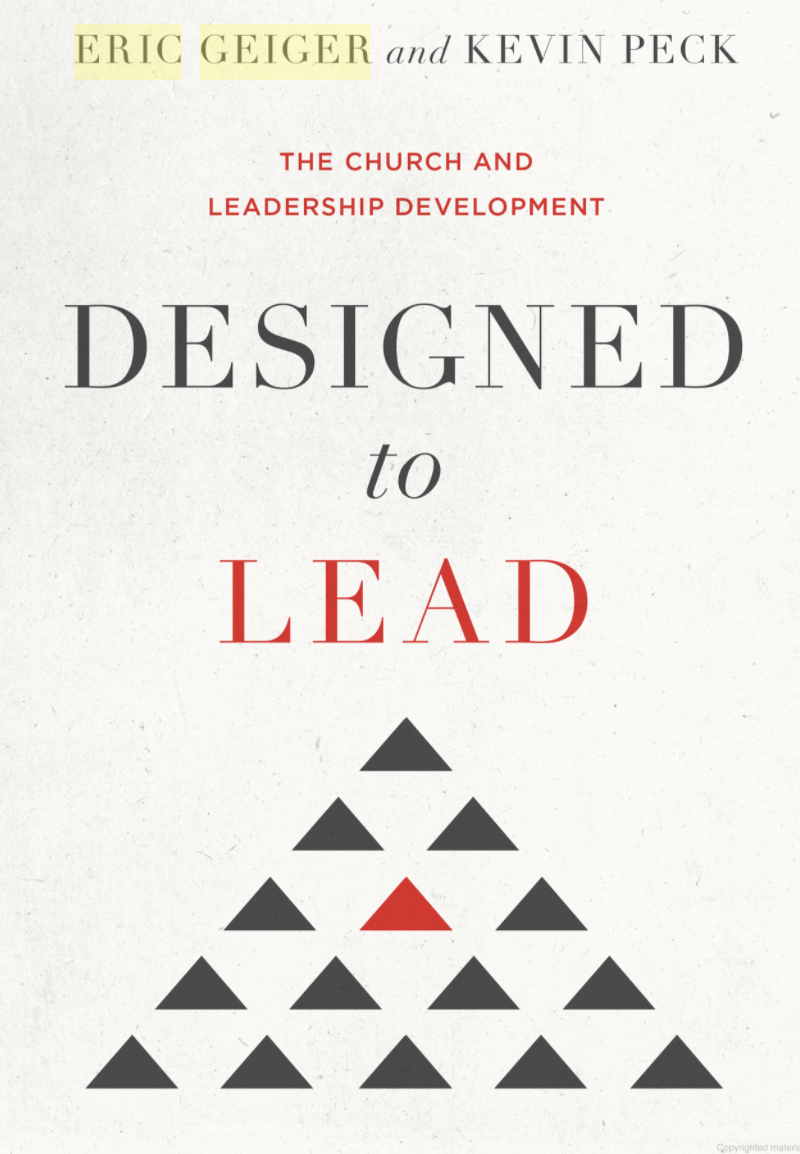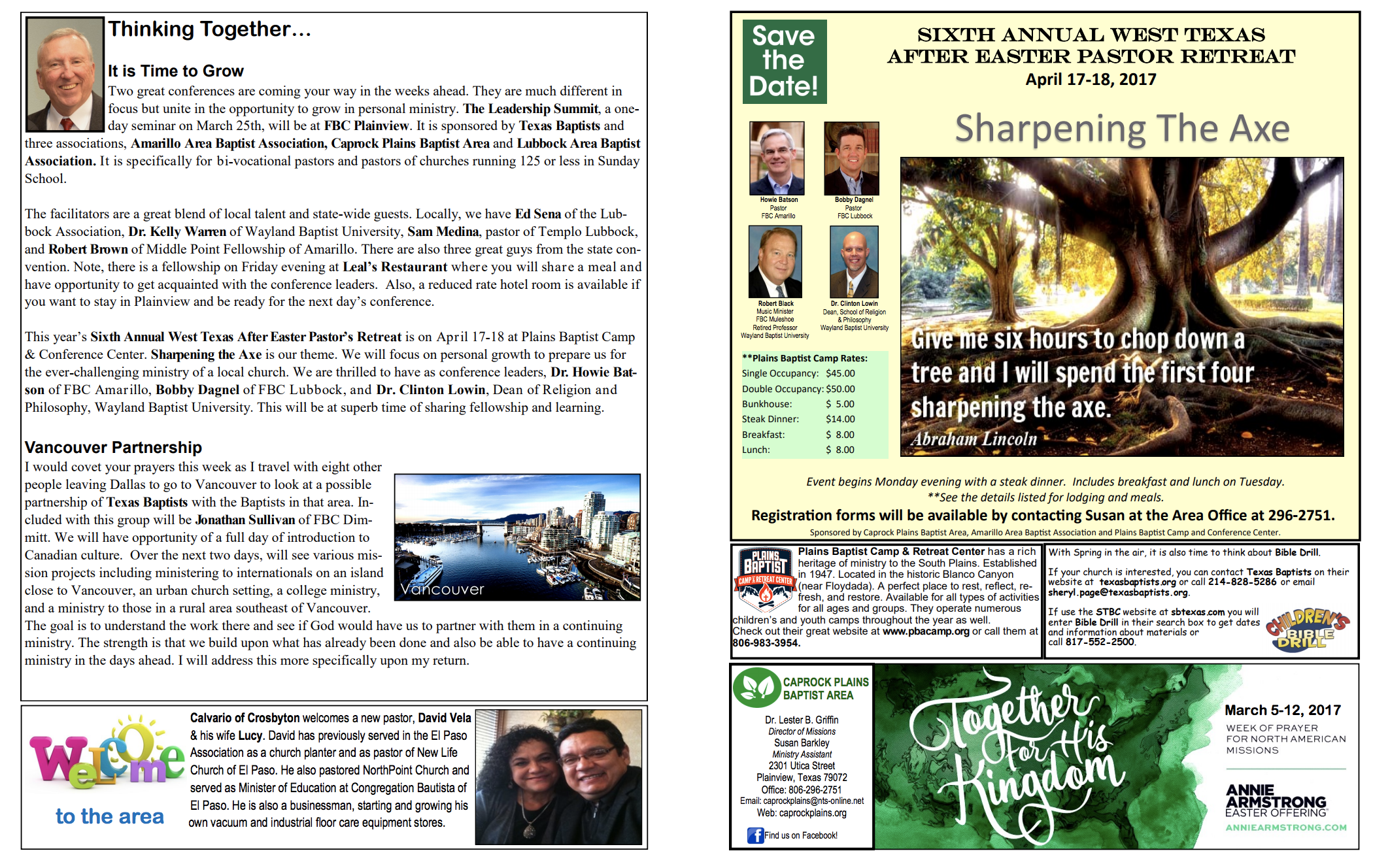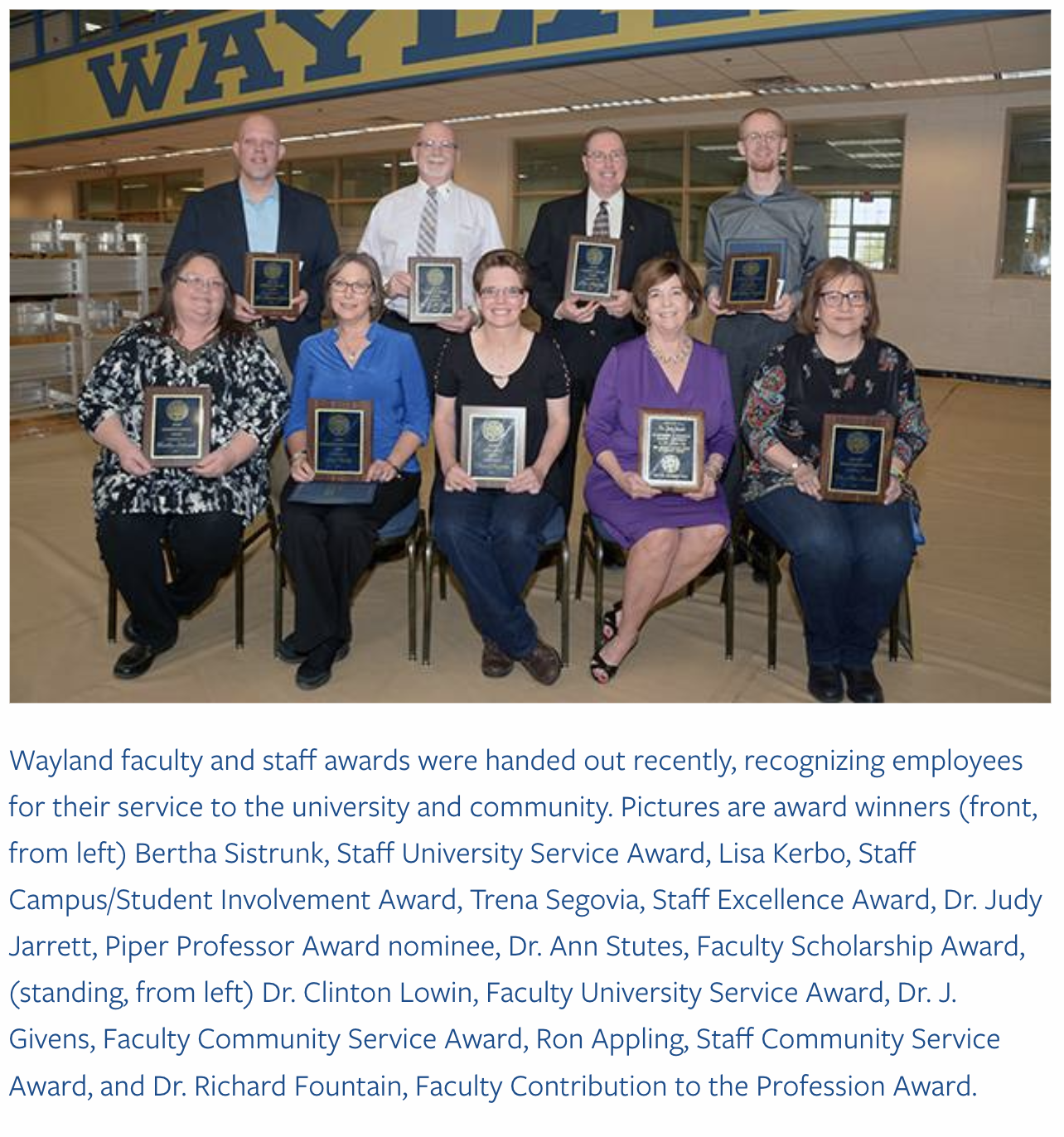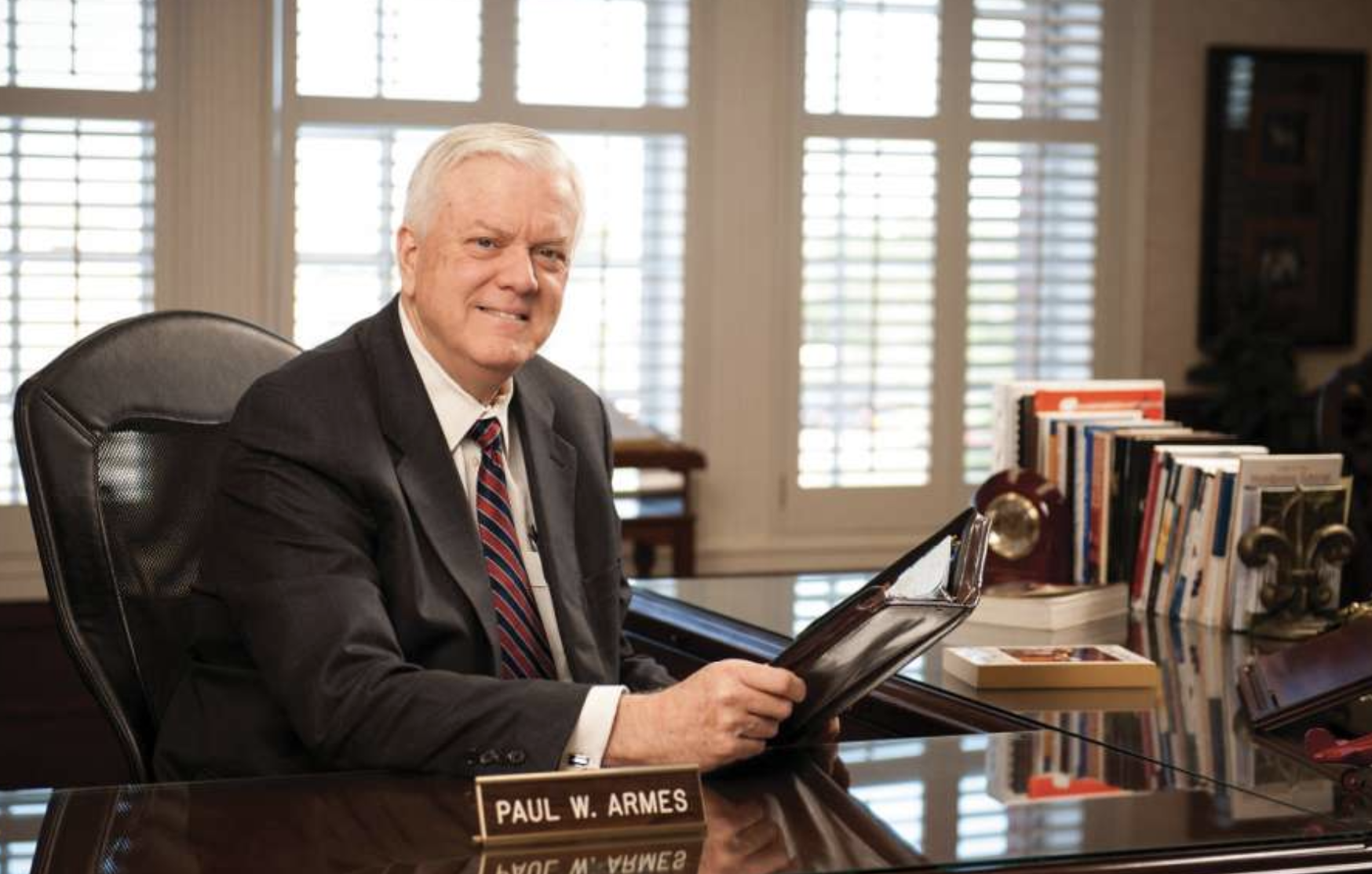
Teaching, Learning, and Research
An assessment of the missional model of graduate theological education: A case study
Clinton W. Lowin
Leadership development from a missional perspective is a model being utilized by academic institutions within graduate theological education. Many of the academic institutions utilizing the missional model are aligning their academic institutions with theological understanding of the church from a missional hermeneutic. Method. This study explained and evaluated the missional model of graduate theological education through a case study assessment of an academic institution that is intentionally implementing the missional model. The research located the influences shaping the missional model of graduate theological education, the educational methodologies within the model, and sought to understand the intended and actual outcomes of the model.
A Digital Strategy for Religious Support
By Dr. Clinton W. LowinJuly 13, 2020 (army.mil)
https://www.army.mil/article/237225/a_digital_strategy_for_religious_support
“If you want something new, you have to stop doing something old.” – Peter F. Drucker
During the first inning of the COVID-19 outbreak, there was an immediate pause of in-person gatherings. This created unrest in chapel communities among chaplains, religious affairs specialists, directors of religious education, and volunteers. The team had to consider new ways to implement religious support in a pandemic setting. Digital strategies emerged, releasing the power of the collective spirit, inviting virtual community building, and empowering innovation.
Release the Power of the Collective Spirit
My unique vantage point, as the USAG Wiesbaden director of religious education, is the USAG Wiesbaden chapel communities, where many of our volunteers have willingly offered their gifts and time to meet the intense spiritual needs of Families during this unprecedented time.
In our garrison and others OCONUS and CONUS, people are working together to find innovative solutions to offer religious education activities like Vacation Bible School (VBS), and small-group ministries to build community, deepen faith formation, and extend service for God and country.
VBS is a staple event for faith formation of Families in most, if not all, garrisons. Families have been kept safe, but well-served by offering alternative formats to the in-person VBS this summer. Due to restrictions for Health Protection Conditions, we could not have reached them otherwise. The same could be true in major changes to Force Protection Conditions.
Here at USAG Wiesbaden, the creation of virtual classrooms, pre-recorded video content, and individual learning packets resulted in 77 children with their parents being encouraged in the safety of their homes during our recent virtual VBS.Though physical human contact can’t be replaced, volunteers eased the spatial gap using engaging livestreams, creating presence, and caring for their crews through real-time interactions around life-changing content for the kids and parents.
Volunteers had collectively directed and created high-quality video material which they fed into virtual learning classrooms using a semi-live streaming format.
See examples:
Day 1-- https://youtube.com/watch?v=Aaia_ruvCqo
Day 2 – https://youtu.be/G-AkbaYtz3c
Day 3 – https://youtu.be/1Oj7J1T4KrY
Day 4 – https://youtu.be/VQMH8AKjGgQ
Day 5 – https://youtu.be/qXdOsZNgKVU
At USAG Italy, my DRE colleague, Dr. Grace Yeuell, has produced personalized video faith formation content aired on Facebook paired with participation guides for families to utilize within their homes. This leverages the family for the intimate process of religious education with their children. At Fort Huachuca, another DRE colleague, Roxanne Martinez, has adapted the VBS script to meet the specific needs for Families by translating the material into a virtual format. She also shared the modifications with other garrisons to adjust for their local contexts.
Virtual VBS formats can also be repeated for future sessions. USAG Wiesbaden and Italy plan to utilize the pre-recorded material to offer future iterations of VBS to serve Families during the PCS “summer surge.” Our initial assessment reveals that Virtual VBS costs are about half those of a traditional VBS. Virtual VBS also uses fewer volunteers but with the potential of serving even more Families.
There are many unknowns for post COVID-19 religious support, but this may be the best time to build teams for innovative ways to address challenges and support opportunities for a new normal – maybe even a better normal. In one of Wiesbaden’s recent training events, “ministry in a post-pandemic world,” our religious support office gathered volunteers and UMTs in a virtual training environment. The goal was to discern a long-term response to the effects of COVID-19 and future similar restrictions to perform or provide religious support for our community in a “new normal.”
Dr. Grace Yeuell, Dr. Rebecca Powell, DRE at USAG Stuttgart, and Susan Nishimura, DRE at USAG Ansbach, have created a digital training space called the volunteer academy online to develop volunteers leading virtual gatherings. The training empowers volunteers to support Army Families through technology. Such virtual instruction also creates a stronger network of training offerings and maximizes efficiency by availing limited garrison assets to a broader digital audience.
Community Building, Digitally
DREs are going beyond historic limits by using digital learning platforms to engage Families, cultivating religious education environments with messages of hope and, support, and providing a fuller spectrum of care during an otherwise disconnecting crisis.
Social distancing guidelines have made it necessary to meet using non-traditional spaces and means to provide access to religious education.
DREs have enabled faith formation by access to digital resources for small group participants through platforms like Right Now Media (RNM) and Formed. RNM offers curated religious education material by streamed video and downloadable learning guides. Small group members participate at any time, anywhere, with other souls around the globe.
The Office of the Chief of Chaplains (OCCH) recently secured access to RNM and Formed accounts for all Army garrisons. In addition, OCCH outfitted Religious Support Offices with high-quality video equipment to empower virtual ministries.
Religious Support Offices are using such platforms for greater synergy by connecting the content of chaplains’ worship services to DRE’s religious education for volunteers’ pastoral care for each other. These teams can leverage RNM and Formed for unique training opportunities to resource small group members with discussion guides related to the sermon series taught in a chapel. The aim is for greater consistency, spiritual depth, and broader community in real-time interactions that build relationships around a chapel message or teaching viewed digitally.
Necessity is the Mother of Innovation
The unfortunate spread of COVID-19 has created the need to discover digital religious support strategies. As the adage denotes, necessity is the mother of innovation. Unit ministry teams, directors of religious education, and volunteers are reinventing the ways and reasons to use social media, video production and video conferencing.
It is true that virtual gatherings will never completely replace in-person gatherings, but during this time, digital strategies provide an option for Families to consistently care for each other. DREs hope to create vibrant community and leverage technology as an opportunity to close the social distance gap and to strengthen spiritual readiness. We believe virtual ministries should never be a temporary substitute for religious support. They must be an enduring addition.
Church leaders have choices, either ride the tsunami of discontinuous cultural change coasting in neutral or shift into drive via leading kingdom transformation as cultural pace-setters and change agents. The former choice rests on the laurels encompassed by a passive spontaneity and an improvisational style of leadership. The latter emulates a discerning transformational style of leadership.
Shifting from neutral to drive: Navigating the future of youth ministry
Clinton W. Lowin
Classroom learning leads Wayland students to practical application
DECEMBER 29, 2011 (Baptist Standard)
PLAINVIEW—Religion students at Wayland Baptist University are putting their education to the test—and not just in final exams.
Students in Clinton Lowin's "Introduction to Baptist Ministry" class were challenged to look at Wayland as their church and conduct a needs assessment to determine what new ministry opportunities might be available.
Little did he know the idea would take on a life of its own. Students not only discovered a need on campus and in the community, but also developed a ministry plan they could undertake in response.
Lowin explained part of his educational strategy is to give students practical experience to coincide with theory and knowledge.
"Learning doesn't happen in a vacuum," he said. "If we are talking about kingdom objectives and functioning in the world, it doesn't have to stop in the classroom."
So, Lowin challenged his class to perform an environmental survey to determine what type of ministry might be needed on the Wayland campus and in the surrounding community.
Students focused on the homeless and hungry and quickly determined that a large percentage of the Plainview population fits the criteria. They also discovered Wayland students who can't afford meals once their meal tickets run out or are not accepted due to a lack of funds.
The group began to formulate a plan for meeting these needs, under Lowin's supervision. He quickly pointed out to the students the project would not earn them a grade or be used for course credit. This didn't dissuade the students. In fact, Lowin thinks it increased their motivation.
"Just doing these things doesn't shut if off at the end of the semester," Lowin said. "This surpasses a grade. This is about the kingdom. Once they got that, it was amazing. It just took off."
As the semester came to an end, the group still was in high gear. Having formed a guiding coalition and discovered community member who shares their concern for meeting the needs of students, the group hopes to hold another planning meeting at the beginning of the spring semester.
From there, they will invite the campus community to determine the amount of interest in their ministry proposal. The group will continue to gather resources and determine the best avenue to feed hungry people—in the community and on campus.
"They are making things happen," Lowin said. "It is for me to just get out of the way and allow them to do the things they love to do and want to do, which is to change the world."
Youth group spends weekend hungry and homeless - Cleveland19
April 24, 2006 at 2:35 PM EDT - Updated July 26 at 3:36 PM
Chapel volunteers bring community to life
By Emily JenningsNovember 4, 2020 (army.mil)
WIESBADEN, Germany – Volunteers play an important role in meeting the spiritual needs of the U.S. Army Garrison Wiesbaden community.
“Volunteers are the hands and feet of our ministry and quite often the creative heads and hearts, too,” said Chap. (Lt. Col.) Jeffrey Dillard, garrison chaplain and Religious Support Office director.
The biggest thing volunteers do is to support their community in ways the chaplains sometimes cannot, Dillard said. On average chaplains serve about 1 to every 1,000 Soldiers, civilians and others, he added.
“Of course our primary focus is on the unit and the mission, but there are a lot of needs that we can’t meet because we are counseling with an individual or we are in an important meeting to strategize and to address major themes,” Dillard said. “Volunteers can bring a greater frequency of connections with their neighbors, and they can bring a greater depth of connection with their neighbors.”
Several volunteer ministry groups serve the Wiesbaden community. Protestant Women of the Chapel, Catholic Youth of the Chapel, Cadence International Hospitality House, Club Beyond Youth Ministries, Mom’s Café, Thrive!, Latter Day Saints Seminary, Catholic Religious Education, LifeTeen and Wednesday Night Alive! serve as educational and auxiliary ministries. One such group is Catholic Women of the Chapel, a group of women who meet to learn religious teachings and provide social support to one another.
“We need that time away from our distractions of life just to be able to refocus ourselves on God, and that gives us the strength to continue in our daily tasks,” said Blanca Cook, Wiesbaden CWOC president.
“The USAG Wiesbaden chapel community is blessed with a tremendous pool of committed volunteers,” said Clinton Lowin, director of religious education for the RSO. Approximately 100 people volunteer in some capacity for one of the educational auxiliary organizations or mass and worship services, he added.
Stephanie Tanner, a volunteer coordinator for Catholic Youth of the Chapel, a group that works with teens “to bring them closer to Christ,” said not being able to meet in person due to COVID-19 has been a challenge, but she leans on fellow CWOC members, a group she is also a member of.
She said she enjoys being a part of a group of women who share the same values and help each other when needed.
“It’s like a support group. Not just spiritually, but emotionally, too,” Tanner said. “It gets us out of our routine, and you have people to talk to and share your experiences with, and you always have somebody to help you if you need help, and it’s a great place to make friends. We learn and we pray together.”
The group helps with the annual priest breakfast, Stations of the Cross and meatless meals during lent, retreats (although not this year due to COVID-19), and social and learning support, Cook said. They also help others in the group and the chapel as needed for baby showers, meal support for individuals who are sick, beautifying the chapel grounds and even cleaning up. “We help wherever we’re needed,” Cook said.
“I think this, honestly, is the best religious community I’ve ever been in,” Tanner said. “And not just the Catholics, but the Protestants, too—everybody supports everybody else. It’s just a really good, positive environment.”
For more information on services and ministry groups, go to home.army.mil/wiesbaden and search “religious services.”
“The first iteration of the program will be on The Five Levels of Leadership, presented by Dr. Clinton Lowin, the garrison director of Religious Education. The other topics for the first quarter will be assisting with grief and loss, presented by Federica LeMauk from Army Community Service in November, and emotional intelligence presented by Dillard in December.”
This year’s Sixth Annual West Texas After Easter Pastor’s Retreat is on April 17-18 at Plains Baptist Camp & Conference Center. Sharpening the Axe is our theme. We will focus on personal growth to prepare us for the ever-challenging ministry of a local church. We are thrilled to have as conference leaders, Dr. Howie Batson of FBC Amarillo, Bobby Dagnel of FBC Lubbock, and Dr. Clinton Lowin, Dean of Religion and Philosophy, Wayland Baptist University. This will be at superb time of sharing fellowship and learning.
April 10, 2018
The university faculty awards were then presented. Dr. Clinton Lowin, Dean of the School of Religion and Philosophy received the University Service Award.
Lilly grants benefit Wayland and Truett programs for high school youth
JANUARY 7, 2016
Wayland Baptist University and Baylor University’s Truett Theological Seminary each received $600,000 grants from the Lilly Endowment’s high school youth theology institutes.
The grant to Wayland will help fund Kaleo, a program designed to foster Christian leadership among high school juniors and seniors. The grant to Truett Seminary will establish Running the Race Well, a youth spirituality and sports institute.
The Lilly Endowment created its high school youth theology institutes initiative to encourage teenagers to explore their religious beliefs and their concerns about contemporary challenges by studying theology and examining how faith calls them to lives of service. Wayland and Truett are among 82 schools nationally participating in the initiative.
Clinton Lowin, associate dean of Wayland’s School of Religion and Philosophy, designed the Kaleo program with the goal to transform the lives of high school students through discovery, discernment and affirmation of God’s call for Christian leadership.
“This grant is one of the most exciting things that has happened to the School of Religion and Philosophy in our history,” Dean Paul Sadler said. “It has tremendous potential to influence the lives of Christian young people, and it also gives churches and Wayland an opportunity to form very productive partnerships.”
Responding to God’s call
Lowin had been in discussion with leaders at the Baptist General Convention of Texas and other organizations who expressed a growing interest in trying to find a way to help more students consider God’s call on their lives, preparing them for service to the church and in their communities.
High school juniors and seniors will enter into a yearlong mentorship program with a senior pastor or youth pastor. Students also will participate in a one-month immersion that focuses on three phases of development—a wilderness camping experience at Glorieta, N.M.; classroom instruction in biblical and theological studies on the Wayland campus and ministry projects through area churches; and a two-week overseas mission trip in partnership with Student International.
After they complete the immersion experience, students will return to their churches and mentors for another eight months of study and learning, when they will be instructed and held accountable by Kaleo for implementing some sort of Christian ministry within their church or community.
Armes thankful for his time at Wayland
JONATHAN PETTY, Wayland Baptist University
Published4:27 am CDT, Monday, May 2, 2016
“As for Wayland, he [Dr. Paul Armes] feels that the university is on the verge of a prosperous period. New programs targeting Texas Department of Criminal Justice employees and Dr. Clinton Lowin’s Kaleo project in religion are just a few of the areas where Dr. Armes feels the university has real opportunity to grow. He also expects Wayland to remain a beacon for Christian higher education.”





